7 Common 2011 Honda Accord Crosstour Problems and Solutions

Overview
This article examines prevalent issues and solutions concerning the 2011 Honda Accord Crosstour. It specifically addresses problems such as:
- The check engine light
- Brake issues
- Electrical malfunctions
- Recalls
Detailed explanations of the causes of these problems are provided, along with an overview of potential costs. Importantly, the article emphasizes the significance of regular maintenance to avert more severe complications, ultimately enhancing the vehicle’s reliability and safety.
Introduction
Navigating the complexities of vehicle maintenance can be daunting for owners of the 2011 Honda Accord Crosstour. The check engine light’s ominous glow and unsettling vibrations during braking highlight the importance of understanding the underlying causes of these issues.
This article explores common mechanical and electrical problems faced by Crosstour owners, detailing symptoms and practical solutions to keep the vehicle performing optimally. Insights on recalls, maintenance costs, and proactive care tips equip drivers with the knowledge needed to tackle potential challenges head-on, ultimately enhancing their vehicle’s longevity.
Check Engine Light: Common Causes and Solutions for 2011 Honda Accord Crosstour
Reasons for Check Engine Light Activation
The check engine light activation in the 2011 Honda Accord Crosstour can occur for various reasons, each indicating potential concerns that require attention:
- Loose Gas Cap: One of the most common triggers for the check engine light is a loose gas cap. Ensuring that the gas cap is securely tightened can often resolve this problem quickly and inexpensively.
- Faulty Oxygen Sensor: The oxygen sensor plays a crucial role in monitoring exhaust emissions. A malfunctioning sensor can lead to increased emissions and decreased fuel efficiency, necessitating replacement to restore optimal performance.
- Catalytic Converter Issues: Problems with the catalytic converter can activate the check engine light. Symptoms may include poor acceleration and unusual exhaust noise, indicating that this component may need repair or replacement.
- Mass Airflow Sensor Problems: This sensor measures the air entering the engine, and if it fails, it can significantly impact engine performance. Addressing this matter promptly is essential for maintaining vehicle efficiency.
Solutions for Check Engine Light Issues
Regular maintenance checks and diagnostics are vital for identifying the specific cause of the check engine light. Using an OBD-II scanner can provide valuable error codes that help identify the problem, allowing for targeted repairs. It’s important to note that some generic OBD-II readers may not read manufacturer-specific codes, which could lead to confusion during diagnostics.
Cost Considerations: Diagnostic fees typically range from $90 to $200+, while check engine light diagnosis and testing may reveal costs ranging from $122 to $233. Tackling problems early can avert more expensive repairs in the future. For example, while a loose gas cap may only cost a few dollars to repair, more severe issues, such as 2011 Honda Accord Crosstour problems like a faulty catalytic converter, can rise to $1,300 or higher, as mentioned by Hometown Chrysler Dodge Jeep Ram.
Consequently, remaining proactive with diagnostics is essential to preventing unexpected costs. Moreover, keep in mind that the check engine light will not reset on its own until the root problem is addressed, highlighting the importance of accurate vehicle diagnostics.
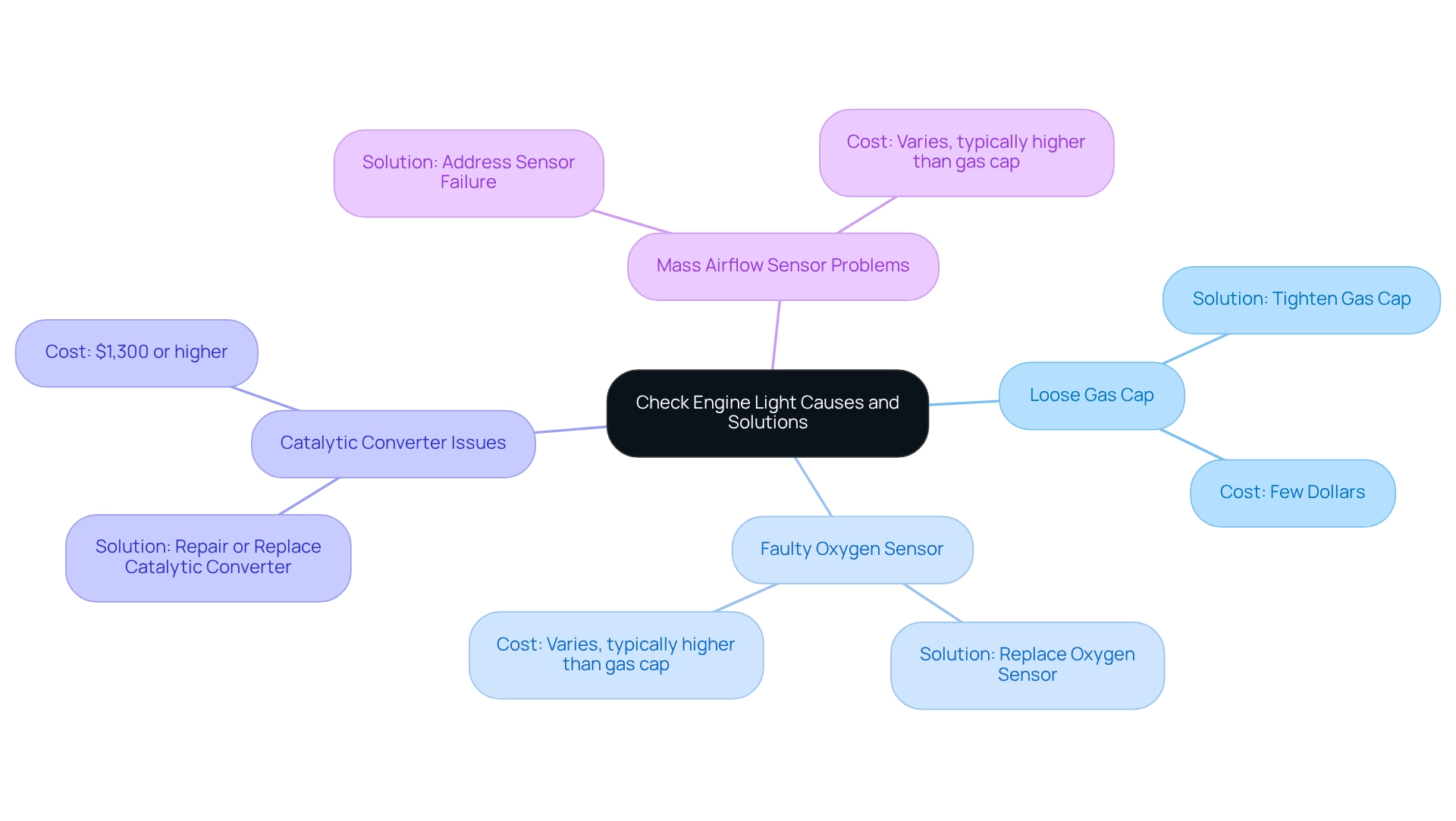
Brake Problems: Understanding Vibration and Shuddering in the 2011 Honda Accord Crosstour
Vibration and shuddering during braking in the 2011 Honda Accord Crosstour can stem from several key issues:
-
Warped Brake Rotors: This is the primary culprit behind brake vibration. Warped rotors often result from excessive heat buildup or wear over time, leading to uneven contact with the brake pads.
-
Worn Brake Pads: Uneven wear on brake pads can also cause shuddering when brakes are applied. Routine examination can assist in recognizing this problem before it intensifies.
-
Brake Caliper Problems: A sticking caliper can disrupt the braking process, resulting in uneven braking and vibrations that can be felt through the pedal.
-
Solutions: To mitigate these issues, regular inspections of the brake system are essential. Resurfacing or replacing warped rotors and worn pads can significantly improve braking performance. According to case studies, the average expense for brake pad replacement related to 2011 Honda Accord Crosstour problems varies from $208 to $273, emphasizing the significance of prompt maintenance to prevent more expensive repairs in the future. Additionally, addressing these problems early can prevent further complications, ensuring a safer driving experience.
It’s also crucial to mention that a recall has been issued for improperly installed passenger airbag inflators during a prior recall for the 2011 Honda Accord, which may impact the overall reliability and safety of the automobile. Furthermore, as automotive journalist Andrew Kaufman states, “Distinguishing brake noise types is one of the fastest ways to gauge the severity of brake problems,” emphasizing the need for drivers to pay attention to any unusual sounds.
For those considering overall maintenance costs, the cost for wheel bearing replacement ranges from $279 to $452, providing additional context for potential repairs.
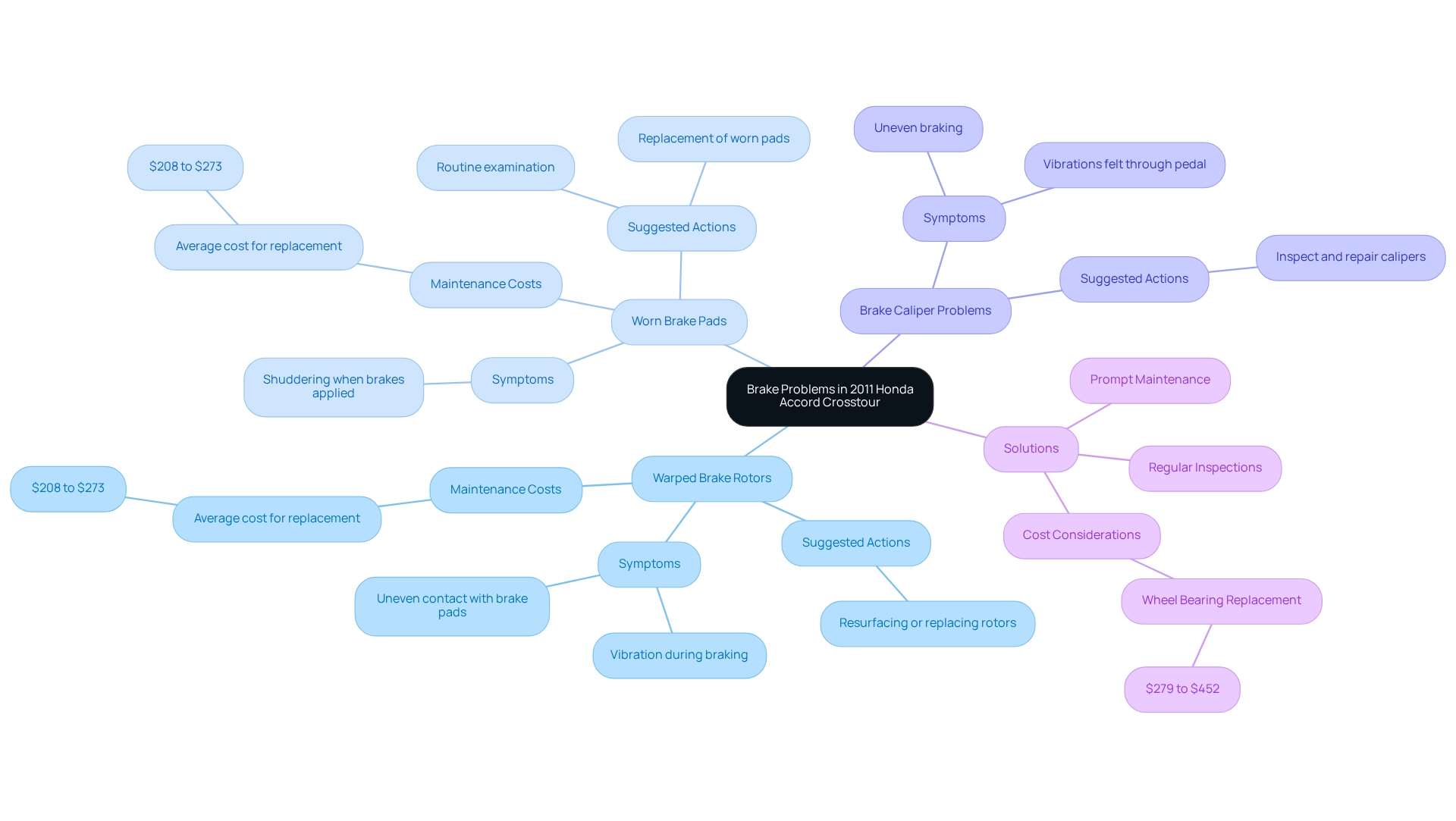
Reliability Issues: Evaluating the Long-Term Performance of the 2011 Honda Accord Crosstour
The long-term dependability of the 2011 Honda Accord is often discussed in relation to the 2011 Honda Accord Crosstour problems. Owners have reported common issues, particularly with the engine, transmission, and electrical systems, highlighting several 2011 Honda Accord Crosstour problems that can significantly impact the automobile’s overall reliability. However, the average annual maintenance cost for the vehicle is approximately $577, a figure that remains competitive within its category. Notably, the expense for engine mount replacement ranges from $1,053 to $1,121, an important consideration for potential buyers.
Owner satisfaction tends to be high, with many praising the car’s comfort and handling. For instance, an unnamed evaluator noted, “The interior is stylish and spacious; I appreciate the exterior design,” highlighting the vehicle’s aesthetic appeal. Another user pointed out its practicality, describing it as an excellent choice for both daily use and hauling due to its spacious interior and useful features like the rearview camera. This positive feedback reinforces the vehicle’s attractiveness, even in light of the 2011 Honda Accord Crosstour problems regarding some reliability concerns.
In terms of long-term performance, reliability ratings and owner satisfaction data indicate that while the vehicle may face specific 2011 Honda Accord Crosstour problems, regular maintenance and timely problem resolution can significantly enhance its durability. For those apprehensive about reliability issues and recalls, Honda customer service is available at 1-888-234-2138 for further assistance. Overall, the 2011 Honda Accord remains a viable option for budget-conscious buyers seeking a blend of comfort and practicality.
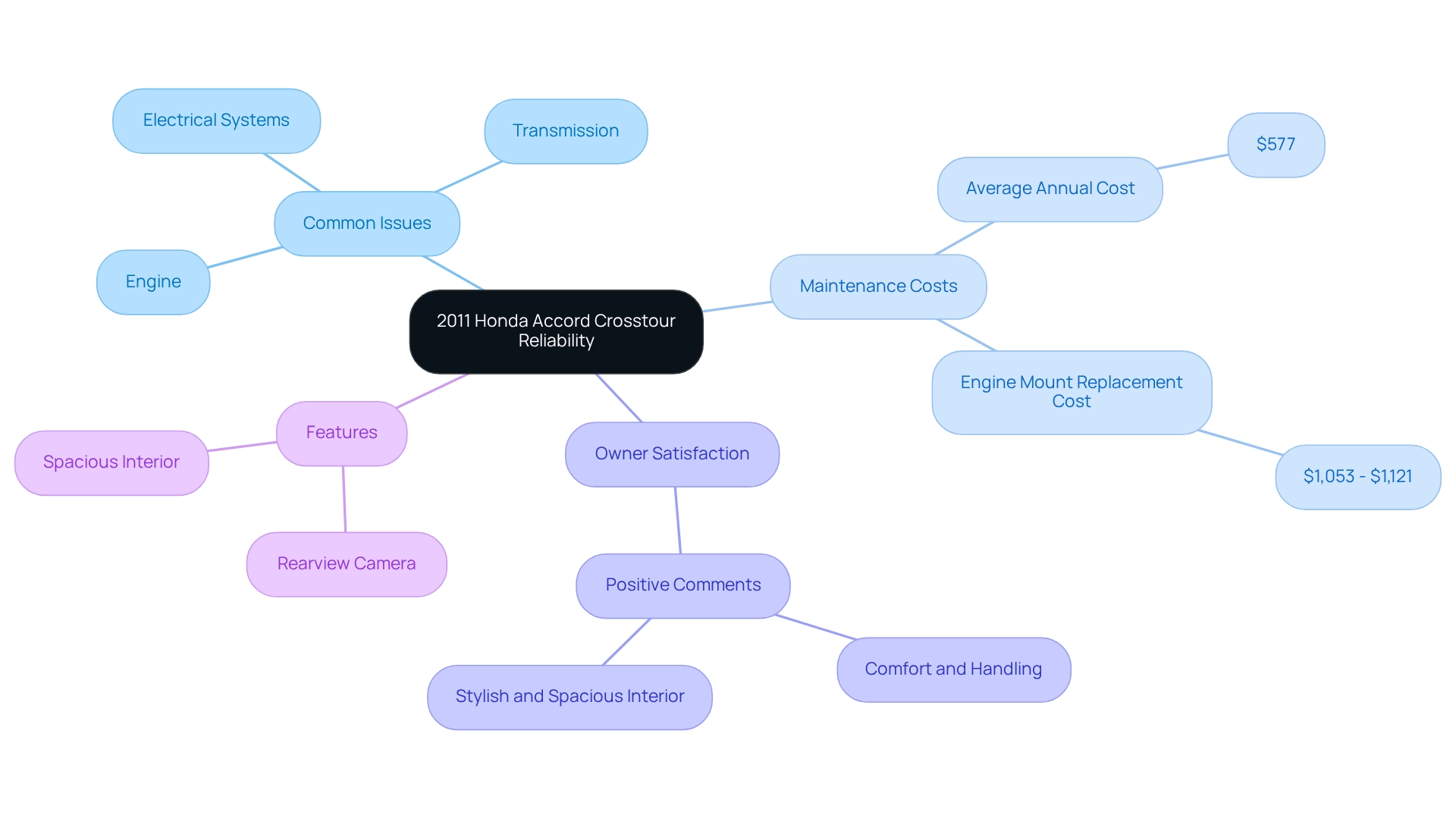
Electrical Problems: Troubleshooting Common Issues in the 2011 Honda Accord Crosstour
Owners of the 2011 Honda Accord Crosstour report common electrical problems, including battery drain, which often stems from faulty alternators or poor battery connections, resulting in unexpected battery failures. Many owners disregard the significance of routine battery inspections, which can avert these frustrating problems. As automotive technician John Doe notes, addressing battery health is crucial for preventing unexpected breakdowns, particularly in cases involving 2011 honda accord crosstour problems, which may manifest as symptoms like flickering dashboard lights or the vehicle not starting, indicating more serious electrical issues. For instance, a case study on the anti-lock brake system warning light highlights how symptoms, such as 2011 honda accord crosstour problems, can lead to significant safety concerns if not addressed promptly.
- Power Accessory Malfunctions: Problems with power windows, locks, and other electronic features are commonly reported, affecting overall convenience and safety. Technicians recommend that drivers pay attention to any irregularities in these systems, as they may signal underlying electrical problems.
Troubleshooting Tips: To mitigate these issues, regularly inspect battery connections and have the electrical system evaluated during routine maintenance. Additionally, consider the implications of the Honda airbag issue from May 2016, which underscores the importance of addressing electrical problems for safety. This proactive approach can help prevent more significant problems down the line, ensuring a smoother driving experience.
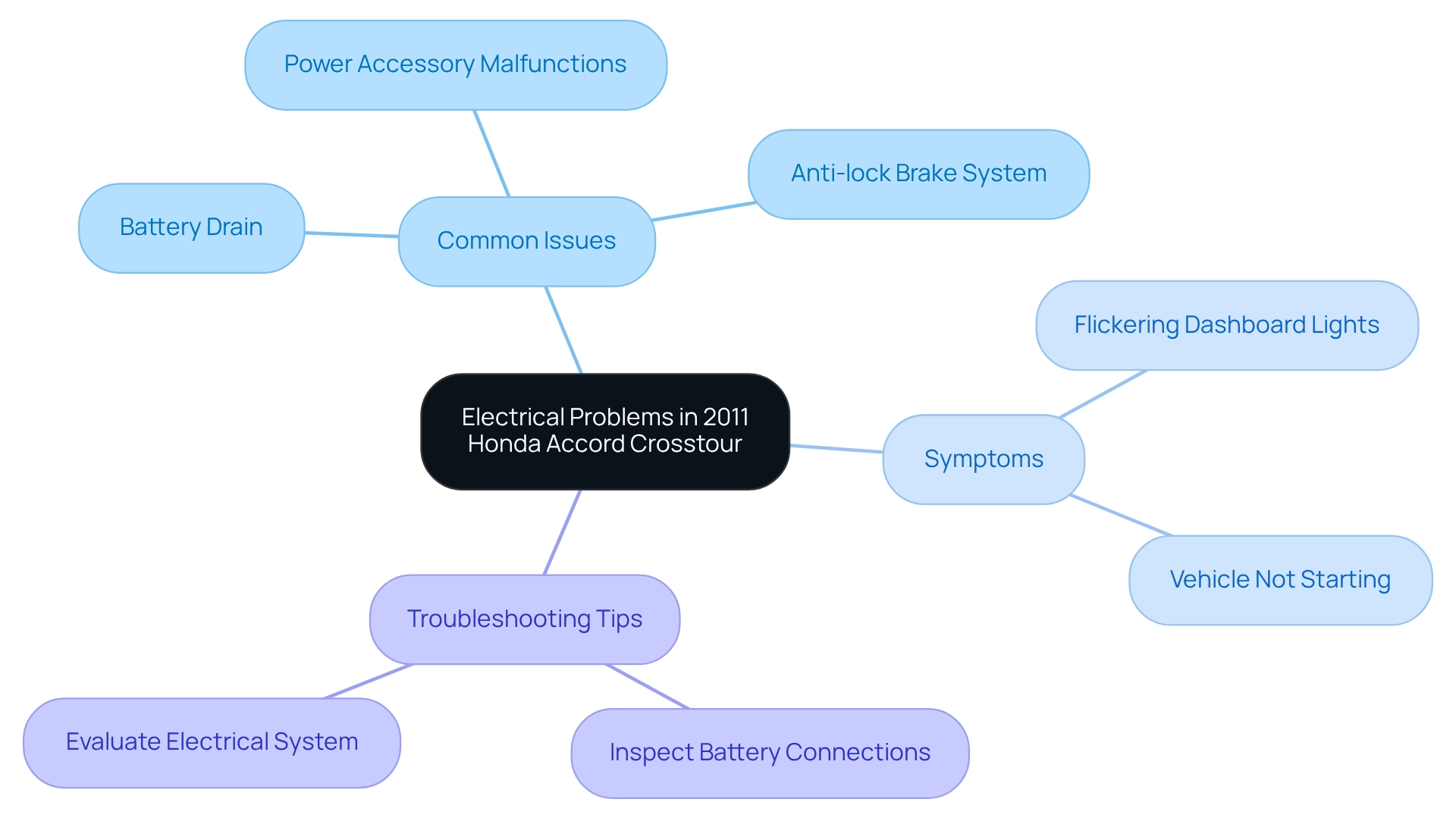
Recalls and Safety Concerns: What to Know About the 2011 Honda Accord Crosstour
The 2011 Honda Accord Crosstour problems include several significant recalls that warrant attention from both current and prospective owners.
- Airbag Issues: Certain models have been recalled due to airbag inflator problems, which can lead to serious safety risks. This emphasizes the importance of confirming that airbag systems are functioning properly to protect occupants in the event of a collision.
- Electrical System Recalls: Recalls concerning the electrical system have been issued, affecting the overall functionality of the automobile. Owners should be aware that electrical failures can lead to unexpected malfunctions, making timely repairs essential.
- Brake System Notifications: Some models have encountered alerts regarding brake-related issues. Given the critical role of braking systems for safety, these notifications require prompt attention to avoid potential accidents.
In addition to these notifications, it is vital to note that the 2011 Honda Accord Crosstour offers an impressive highway fuel efficiency of 46.8463 MPG. This is a crucial factor for budget-minded buyers looking to manage fuel expenses effectively.
To stay informed, owners should frequently check their vehicle’s VIN with the National Highway Traffic Safety Administration (NHTSA) database for any active notifications. As the NHTSA advises, “If there are any outstanding safety notices on your vehicle, reach out to a dealer at your earliest convenience to have repairs completed.” Keeping current contact details with manufacturers is essential for receiving timely safety notifications.
Moreover, understanding the impact of product withdrawals on resale value is crucial. For instance, the numerous problems leading to recalls of the 2011 Honda Accord Crosstour may influence consumer perception and market worth. Regular inspections can help mitigate safety hazards and ensure that necessary repairs are completed swiftly, highlighting the importance of proactive maintenance.
Furthermore, consumers are encouraged to check for safety notices regularly, especially if they are not the original owners of the vehicle. This diligence can prevent safety risks and ensure that essential repairs are addressed promptly. Lastly, for those seeking repair options, numerous locations across the United States, including cities like Phoenix, Los Angeles, and New York, provide services for addressing these recalls.
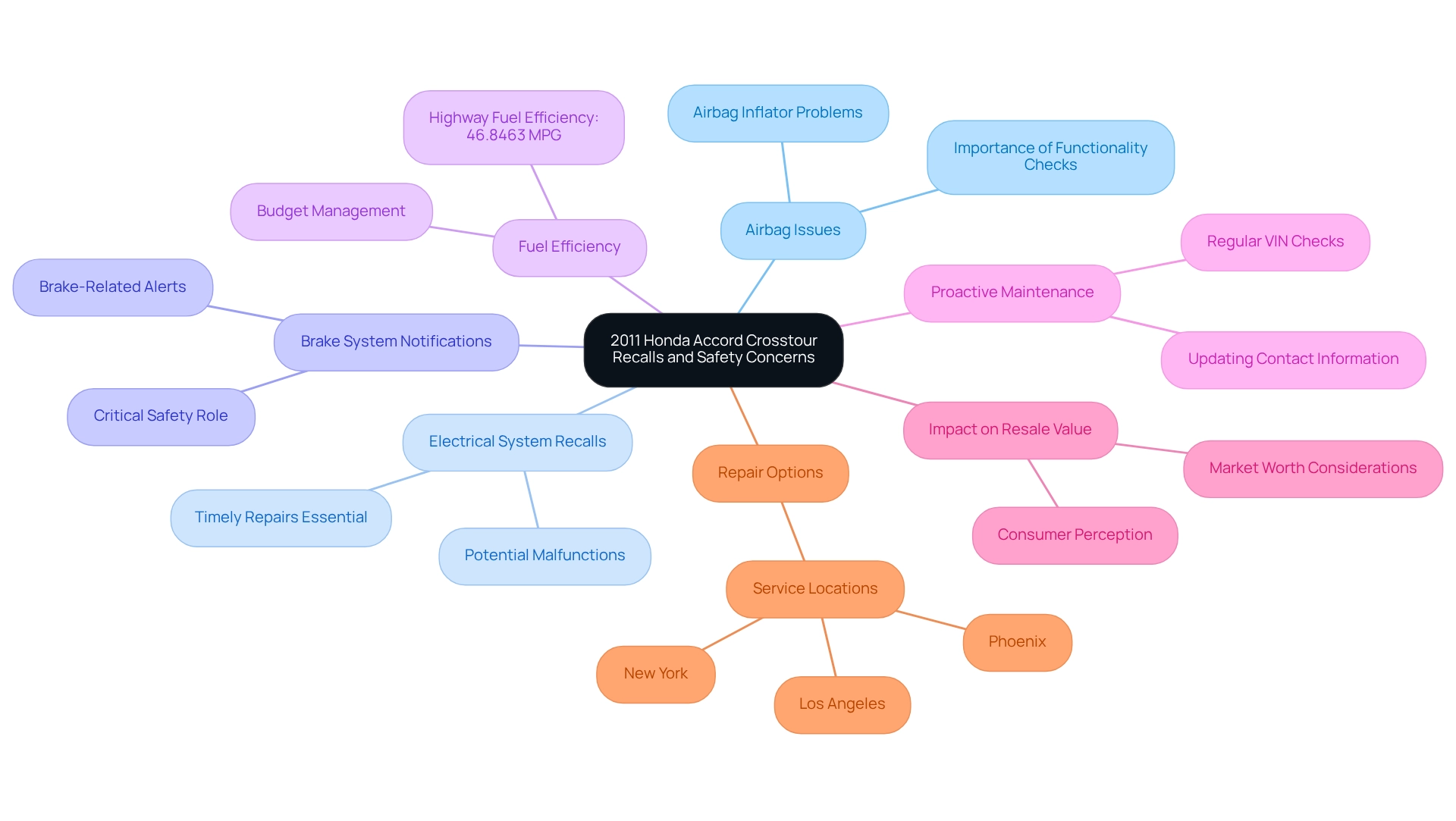
Conclusion
Understanding the common issues associated with the 2011 Honda Accord Crosstour is crucial for maintaining its performance and safety. From the check engine light to vibrations during braking, recognizing symptoms early can help prevent more serious problems down the line. Key issues such as:
- Loose gas caps
- Faulty oxygen sensors
- Warped brake rotors
have identifiable solutions that can save both time and money when addressed promptly.
Additionally, the vehicle’s reliability can be bolstered through regular maintenance and awareness of recalls. Despite some reported reliability concerns, owner satisfaction remains high due to the Crosstour’s comfort and functionality. Staying informed about recalls, particularly those involving airbags and electrical systems, is essential for ensuring safety and preserving vehicle value.
Ultimately, proactive care and timely repairs not only enhance the longevity of the 2011 Honda Accord Crosstour but also provide peace of mind for owners. By understanding and addressing potential mechanical and electrical issues, drivers can ensure a safer, more enjoyable driving experience while maximizing their investment in this versatile vehicle.
Frequently Asked Questions
What are the common reasons for the check engine light to activate in the 2011 Honda Accord Crosstour?
Common reasons include a loose gas cap, faulty oxygen sensor, catalytic converter issues, and mass airflow sensor problems.
How can a loose gas cap affect the check engine light?
A loose gas cap is one of the most frequent triggers for the check engine light, and ensuring it is securely tightened can often resolve the issue quickly and inexpensively.
What are the implications of a faulty oxygen sensor?
A malfunctioning oxygen sensor can lead to increased emissions and decreased fuel efficiency, requiring replacement to restore optimal vehicle performance.
What symptoms indicate potential catalytic converter issues?
Symptoms may include poor acceleration and unusual exhaust noise, suggesting the catalytic converter may need repair or replacement.
Why is the mass airflow sensor important for the vehicle?
The mass airflow sensor measures the air entering the engine, and if it fails, it can significantly impact engine performance, making prompt attention essential.
How can I diagnose the cause of the check engine light?
Regular maintenance checks and diagnostics are vital. Using an OBD-II scanner can provide valuable error codes that help identify the specific problem for targeted repairs.
What are the typical costs associated with diagnosing check engine light issues?
Diagnostic fees typically range from $90 to $200+, while check engine light diagnosis and testing may cost between $122 and $233.
What could happen if I ignore the check engine light?
Ignoring the check engine light can lead to more expensive repairs in the future, as problems like a loose gas cap are inexpensive to fix compared to severe issues like a faulty catalytic converter, which can cost $1,300 or more.
Will the check engine light reset on its own?
No, the check engine light will not reset until the root problem is addressed, emphasizing the importance of accurate vehicle diagnostics.





